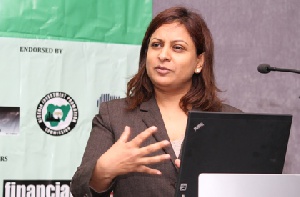Chief Economist with Standard Chartered Bank, Africa, in charge of Global Research, Razia Khan has urged Ghana to work its way out of its debt distress situation by growing its real Gross Domestic Product (GDP).
According to her, “If nominal GDP is growing, especially if there is a strong boost to real GDP and the denominator in that equation is growing, then hopefully your GDP is growing faster than your debt.”
Speaking at a media briefing session in Accra, on the topic ‘Current trends in the global economy and the medium term macro economic outlook for Ghana,’ Ms Khan stressed the need for the Ghanaian government to extend the maturity of its debts.
She commended government for its efforts at re-profiling its debt, saying “Ghana has done this very well, going for sizably more longer-term debt issuances in the local currency debt market.”
Figures from the Bank of Ghana (BoG) show that Ghana’s total public debt stock hit GH¢137 billion as of May 2017.
Ghana, the economist noted, had traditionally been too reliant on very short-term financing of its debts when it rather had to extend maturities and needed to go beyond the rollover risk.
The economist pointed out that it was crucial for government to look to broadening the investor base for its domestic debt, a measure, she indicated, government had commenced as part of its debt management strategy.
“We believe that these reforms are underway; institutional investors in Ghana are now encouraged to buy more local currency longer-term debt, and this is a good thing; it’s a healthy development,” she observed.
She maintained that it was important to get the balance between external financing and domestic financing right to avoid the problem of debt unsustainability.
Ms Khan admitted, however, that “Ghana is caught up in a difficult situation; Ghana has taken on so much external debt; debt that it has to repay in dollars that it isn’t really a choice to allow its currency to weaken.”
According to her, “Ghana’s debt service as a percentage of revenue collected is substantially higher than a lot of peer economies and that is of great concern; Ghana has to do everything right to get out of this situation.”
Touching on spending, Ms Khan observed that when most African governments end up spending more than they have budgeted for, they are not able to finance that spending; they only do so by running up larger arrears, meaning they are not paying suppliers, and contractors and those suppliers and contractors may have taken up bank loans.
“In a lot of countries we have seen government arrears as a percentage of GDP rising to such high levels that it directly correlated with the rising non-performing loans in the banking sector,” she explained.
Banks are, therefore, not going to be in a strong position; there’s not going to be strong risk appetite; they are not going to be lending a lot more, because they are concerned about how high NPLs are already; they might have to provision for those loans as it’s a big cost.
Business News of Saturday, 19 August 2017
Source: thefinderonline.com

















